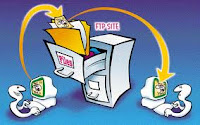THE IMPORTANCE OF SECURE EMAIL
As a new business owner or employed for someone, you don't want that companies business emails being read by anyone. So, what can you do to protect yourself? One thing you can do is get Secure Email.
What Is Secure Email:
Secure Email is a safe, efficient alternative to regular email, fax, and post. When you hit the send button on your secure email, the information contained in it is encrypted, so it can only be read by your intended recipient. Unlike regular emails, that can easily be read by anyone.
How Does Secure Email Work:
Secure Email allows you to encrypt the contents of your email when you send it. This encryption ensures that the email, if intercepted, will not be readable. Once the email reaches its destination it will be decrypted so that the intended recipient can read it. There are two types of encryption.
- Asymmetric Encryption - this system requires a user to use two alphanumeric keys, one private and one public. Your public key is avaliable to anyone. This allows an outside sender to automatically generate a code using a defined set of explicit instructions. When someone sends you an encrypted email, you can use your public key to translate the message. Only you can decipher the code, using a private key. To generate a public key, you will need to install a security program and set up and verify a pass phrase.
- Symmetric Encryption - also known as single key or private key encryption, sharing one key between a sender and receiver. That means you and the receiver need to decide on a password before sending the encrypted message. Coding and decoding runs faster than asymmetric encryption. However, this can leave you email message more vulnerable to hackers because it is a shared key between two people.
When Is Secure Email Available:
Secure Email is available 24 hours a day, seven days a week.
How Can I Download Secure Email:
You first need to figure out what secure email option you want to use that will best fit your needs. There are free ones and those you can pay for that offer more options. Below are a few links:
http://www.comodo.com/home/email-security/secure-email.php
http://www.voltage.com/products/zdm.htm
http://www.globalscape.com/
http://s-mail.com/
Although secure email should not be the only protection method you take, it will help you sleep a little better at night knowing that the right people are receiving your messages.
Click on this link to watch an informative video about secure email from Mindful Security:
http://www.youtube.com/watch?v=MrElNQn5aGo
Work Cited:
http://www.net-security.org/article.php?id=816
http://email.about.com/od/emailtrivia/f/emails_per_day.htm
http://www.cjsm.cjit.gov.uk/why/common_questions.php#connected
http://www.google.com/search?q=secure+email
https://www.starfinancial.com/security-center/secure-email
http://www.telegraph.co.uk/news/uknews/1562304/Online-crime-hits-300-per-minute.html










